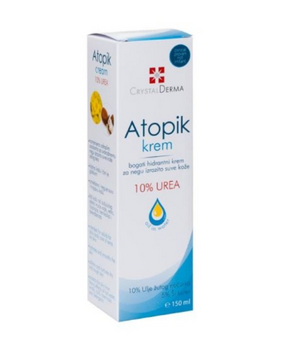Free Delivery on all Orders Over €100
Eczema
Eczema is a general term for skin diseases where the skin is inflamed due to, for example, allergies, irritants or other factors. Eczema is characterized by redness, itching, dandruff, small blisters and dry skin. There are many possible causes of eczema, and the cause can vary among the types of eczema.

Causes of eczema
There is usually not just one cause of eczema, but several factors can come into play, and there can be both hereditary factors and environmental factors. Typical environmental factors that lead to eczema are:
Dry skin
High sebum production
Damp/moist skin over a longer period of time
Damaged skin barrier
Allergic reaction
Irritating substances
Sunlight
The most common types of eczema can be categorized according to what they are caused by:
Atopic eczema: The cause of atopic eczema is not yet clear, but it is known that heredity plays a major role. Eczema often occurs together with other allergies that can worsen the condition.
Diaper rash: The skin can quickly become irritated if there is a dense and moist environment in the nappy. Mechanical irritation, urine and faeces in the nappy can worsen the rash.
Contact eczema: When the skin comes into contact with allergic or irritating substances, it can lead to damage to the skin's barrier. Prolonged exposure to water, soaps and cleaning agents can irritate the skin and damage the skin barrier. Allergens such as rubber, perfume, nickel and preservatives can cause an allergic reaction on the skin.
Seborrheic eczema: This condition typically occurs on skin areas with high sebum production and is typical of the scalp. The increased sebum production leads to increased growth of the yeast Malassezia, which is already present in our normal flora. The increased growth can lead to eczema in some.
Solar eczema: Solar eczema is caused by light from the sun in the form of UVA and UVB. Eczema can be caused by direct sunlight, but also because certain substances in skin products can irritate when they are exposed to sunlight. Some medicines can make you sensitive to sunlight.
For most people who get eczema, dry skin is a big factor. However, this does not apply to seborrheic eczema. Read here for more information about seborrheic eczema.
Symptoms of eczema
In general, for eczema, the symptoms can be divided according to how long the eczema has lasted. Eczema can be acute where the skin suddenly flares up with a red and often moist rash. The fluid from the moist rash can dry and settle on the skin as a thin, scaly layer. If the eczema oozes a lot or emits yellow pus, a doctor should be contacted. Chronic eczema is characterized by long-term eczema with thick dandruff/scaling. There is no specific time frame for what defines acute or chronic eczema.
Acute eczema: In the case of solar eczema and contact eczema, the symptoms may be typical of acute eczema. The rash will mainly be dry, but many may also get small blisters that can leak fluid.
Small blisters with fluid
Dry skin
Itch
Redness
Heat
Thin dandruff/scaling
Chronic eczema: The symptoms of chronic eczema are typical for adults with atopic eczema and other rarer types of eczema.
Thick dandruff/flaking
Dry and cracked skin
Itch
Redness
The symptoms of eczema can vary from person to person, and from eczema type to eczema type.


